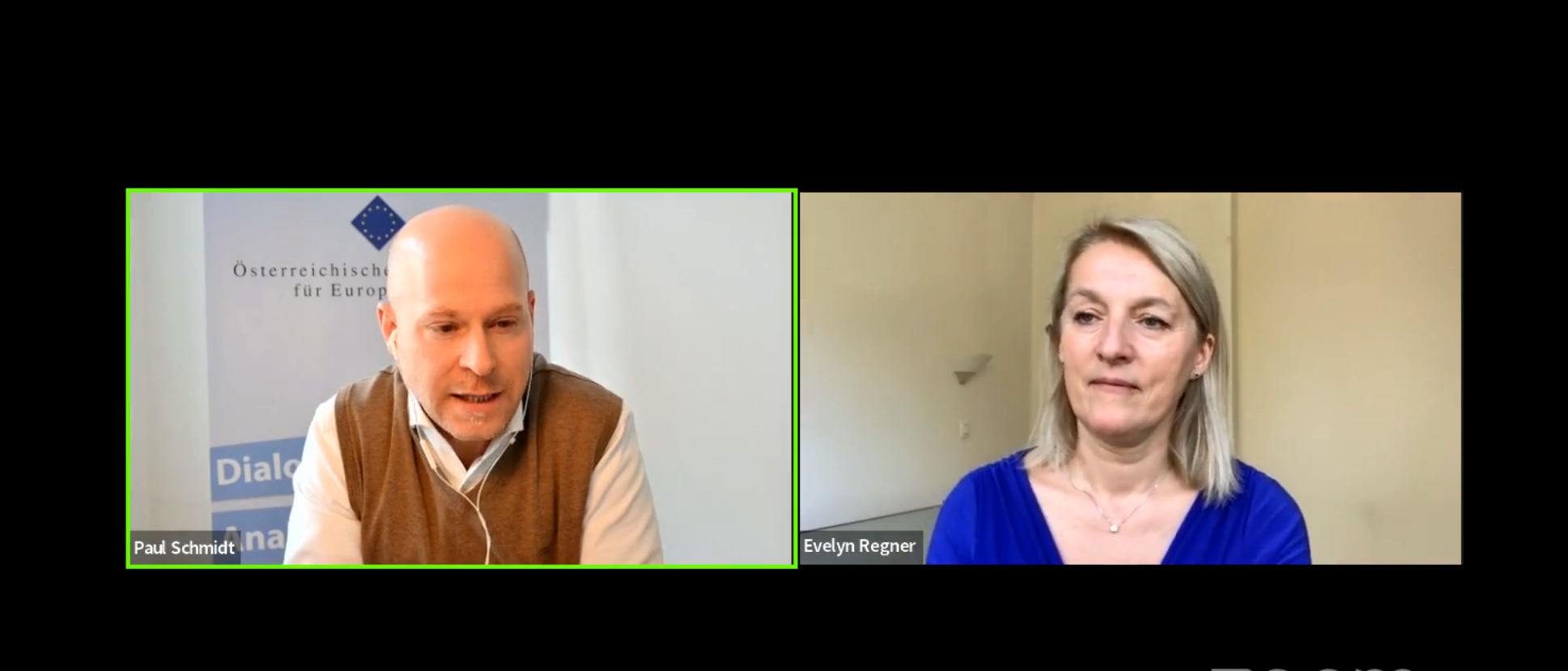Paul Schmidt im Gespräch mit Evelyn Regner.
Weitere interessante Artikel
23. Juli 2024
Krone TV “Nachgefragt”: Wichtige Wahl für EU – Harris gegen Trump
Paul Schmidt spricht im Krone TV-Interview über die Bedeutung des US-Wahlkampfs für die EU, die Sicht der Europäischen Union auf Ungarns aktuelle Ratspräsidentschaft und die Prioritäten der wiedergewählten Ursula von der Leyen.
22. Juli 2024
Puls24 NEWS: EU-Parlament kommt erstmals seit Wahl zusammen
Paul Schmidt, Generalsekretär der österreichischen Gesellschaft für Europapolitik, spricht im Puls24 NEWS Interview über die erste Sitzung des EU-Parlaments nach der EU-Wahl im Juni. Als mögliche Themen werden die Neubesetzung zahlreicher Spitzenjobs und der Ratsvorsitz Ungarns erwartet.
11. Juli 2024
The European Union in Search of Its Own Mythology
By: Olena Pokotilo
The attractiveness of the European Union is based on its economic and social model as well as on its manifold national cultural heritage. Throughout the post-Cold War period, the EU has not actively promoted pan-European myths and struggles today with creating a cohesive and credible common narrative. In this context, the author of this Policy Brief argues that to maintain its unity amidst global instability and evolving political landscapes, the EU must develop new, meaningful myths. She discusses the characteristics of the myth-design of the Union and offers policy recommendations.
The attractiveness of the European Union is based on its economic and social model as well as on its manifold national cultural heritage. Throughout the post-Cold War period, the EU has not actively promoted pan-European myths and struggles today with creating a cohesive and credible common narrative. In this context, the author of this Policy Brief argues that to maintain its unity amidst global instability and evolving political landscapes, the EU must develop new, meaningful myths. She discusses the characteristics of the myth-design of the Union and offers policy recommendations.
Neueste Beiträge
Weitere interessante Artikel
23. Juli 2024
Krone TV “Nachgefragt”: Wichtige Wahl für EU – Harris gegen Trump
Paul Schmidt spricht im Krone TV-Interview über die Bedeutung des US-Wahlkampfs für die EU, die Sicht der Europäischen Union auf Ungarns aktuelle Ratspräsidentschaft und die Prioritäten der wiedergewählten Ursula von der Leyen.
22. Juli 2024
Puls24 NEWS: EU-Parlament kommt erstmals seit Wahl zusammen
Paul Schmidt, Generalsekretär der österreichischen Gesellschaft für Europapolitik, spricht im Puls24 NEWS Interview über die erste Sitzung des EU-Parlaments nach der EU-Wahl im Juni. Als mögliche Themen werden die Neubesetzung zahlreicher Spitzenjobs und der Ratsvorsitz Ungarns erwartet.
11. Juli 2024
The European Union in Search of Its Own Mythology
By: Olena Pokotilo
The attractiveness of the European Union is based on its economic and social model as well as on its manifold national cultural heritage. Throughout the post-Cold War period, the EU has not actively promoted pan-European myths and struggles today with creating a cohesive and credible common narrative. In this context, the author of this Policy Brief argues that to maintain its unity amidst global instability and evolving political landscapes, the EU must develop new, meaningful myths. She discusses the characteristics of the myth-design of the Union and offers policy recommendations.
The attractiveness of the European Union is based on its economic and social model as well as on its manifold national cultural heritage. Throughout the post-Cold War period, the EU has not actively promoted pan-European myths and struggles today with creating a cohesive and credible common narrative. In this context, the author of this Policy Brief argues that to maintain its unity amidst global instability and evolving political landscapes, the EU must develop new, meaningful myths. She discusses the characteristics of the myth-design of the Union and offers policy recommendations.






